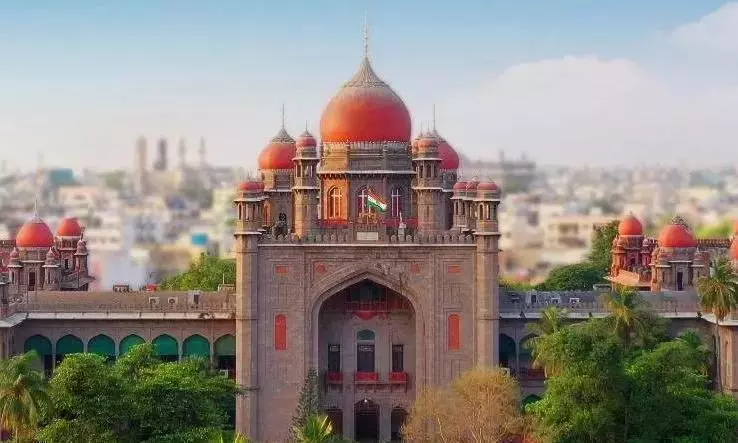Hyderabad: A two-judge panel of the Telangana High Court deferred hearing in PILs complaining of the non-establishment of the Telangana Commission for Schedule Tribes. The panel comprising acting Chief Justice Sujoy Paul and Justice Renuka Yara was dealing with two PILs, one filed by Rapolu Bhaskar, a practising advocate, and another Bhukya Deva Naik. The PILs sought directions to appoint a commission by virtue of the State Commission for Scheduled Tribes (Amendment) Bill, 2013, and Article 338A (9) of the Constitution of India. The commission is intended to function as a specialised constitutional body to protect the rights and interests of the Scheduled Tribes (STs) at the state level. The panel directed the government to file its response within two weeks and directed the petitioners to file a rejoinder if any within two weeks thereafter.
Plea seeks fresh list for MPTC poll
Justice T. Madhavi Devi of the Telangana High Court took on file a writ petition challenging the final list of mandal parishad territorial constituencies (MPTCs) published by the district collector and district election authority in PA Pally mandal, Nalgonda district. The judge was hearing a writ plea filed by Palle Satyanarayana, an ex-sarpanch of PA Pally, and five others, assailing the action of the respondent authorities in publishing the final list of MPTCs without first issuing a draft notification or inviting objections, as required under the relevant administrative guidelines. The petitioners contended that the final list issued by the district collector and district election authority through proceedings dated February 3, 2025, was arbitrary and in direct violation of the instructions issued by the principal secretary, panchayat raj and rural development department, under Memo dated January 30, 2025. The petitioners contended that the respondent authorities had failed to publish the draft MPTC list and did not dispose of the objections already submitted, thereby denying them a fair opportunity to participate. The petitioners sought a direction to set aside the final publication and to direct the authorities to follow due process by first issuing a draft notification, inviting and considering objections, and only then publishing the final MPTC list in accordance with the official guidelines. The judge directed the government pleader for panchayat raj to get instructions from the respondent authorities and posted the matter next week.
Firm challenges closure order
A two-judge panel of the Telangana High Court comprising Justice T. Vinod Kumar and Justice P. Sree Sudha took on file a writ plea challenging closure orders issued against Shree Jaya Laboratories Pvt. Ltd. The petitioner contended that the closure order issued on March 1 was arbitrary, contrary to the provisions of the Air (Prevention and Control of Pollution) Act and principles of natural justice. According to the petitioners, the action was taken following a complaint received by a night patrolling team on January 4 alleging that effluents were being discharged through a yellow pipeline outside the premises into nearby agricultural fields. The petitioner denied any wrongdoing and challenged the closure as a high-handed act without due process. Respondent authorities objected to the maintainability of the writ petition. The panel observed that whether the writ petition was maintainable without exhausting alternative remedies was a question that would be considered at the time of final adjudication. The panel sought clarifications on the status of the application of the petitioner and what remedial measures had been taken since the issuance of the closure order. The panel directed the respondent authorities to file their counter affidavits by next date of hearing.
College challenges Education Act Sec. 20
The Telangana High Court will continue to hear a plea challenging the stance of the government on the AICTE-approved student intake for the academic year 2024-25. Justice K. Lakshman was dealing with a batch of writ petitions filed by MGR Educational Society and others. The petitioners sought a declaration of Section 20 of the Telangana Education Act, 1982 as unconstitutional and ultra vires in its application to approvals granted under the AICTE Act, 1987. They requested the court to strike down a memo issued in August 2024, as arbitrary, unlawful, and violative of constitutional provisions. The petitioners contended that the college received full approvals from AICTE and JNTU for its courses and increased intake for the academic year 2024-25. However, the state government’s reliance on Section 20 of the Telangana Education Act and the issuance of the memo had prevented the institution from admitting students to its full sanctioned capacity. The plea sought directions to treat the petitioner institution as a duly approved college for the academic year 2024-25 and to allow it to fill up seats either through a fresh mop-up round of TG Eapcet counselling or through spot admissions. The court had in September 2024 rejected the request for interim relief, observing that, since admissions were completed and the subject course commenced from August, the court was not inclined to grant the interim reliefs sought by the petitioners. The court also dismissed the interim prayer which sought suspension of the impugned government memos and a direction to the authorities to notify all approved courses and intake in the mop-up and spot admission phases of TG Eapcet 2024-25. The main writ petition was posted for further hearing.






